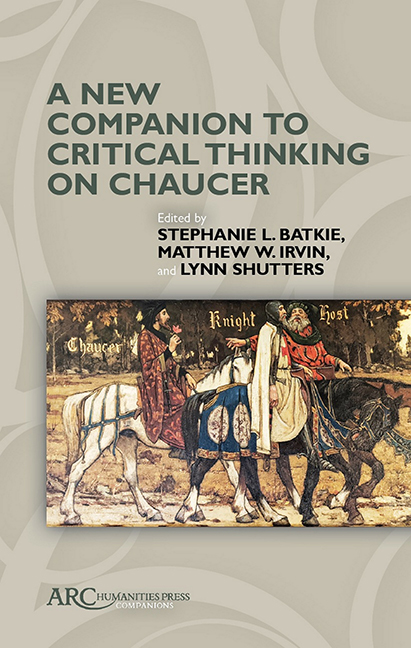Book contents
Response: Vertu, Wal, Thing, Blak
Published online by Cambridge University Press: 21 October 2021
Summary
A NIGHT DARK as pitch, an open window, a kiss, a blade, somebody's “hole”: it's a setting full of angry, mean possibilities where anything can happen. Humiliation and rage confront brash self-confidence and erotic energy with a sharp object. A fart brings it all down: bodies and intentions, pokers and odours collide.
This is, of course, the denouement of the Miller's Tale, the tale Cord Whitaker has so provocatively taken up in his essay. Whitaker focuses on the effictio of Alisoun, the description of her body, at the outset of the tale; I want to shift to the final scene in order to explore the implications of Whitaker's essay as well as the essays by Holly A. Crocker, Marion Turner, and Steele Nowlin. All four are set against fixed boundaries, lead us productively into category confusion, share an antifoundational orientation. The identity categories these articles take up (race, gender, the human) are not binary in their internal dynamics (white orblack, male or female, human or nonhuman) but, rather, there's an “interplay,” to use Whitaker's term, between black and white; between male and female; between human and nonhuman. Both/and rather than either/or: this is the way even walls can work in Chaucerian fictions. These articles collectively argue against pure and stable categories.
Let's pick up the Miller's Tale where Whitaker leaves off, then, and see what this antifoundational orientation leads us to see. This fateful final scene shows Alisoun and Nicholas, having engineered a night of sex, interrupted by the eager would-be lover Absolon at the bedroom window. As everyone who has read the tale will remember, Alisoun tricks him into kissing her nether parts; in a fury he returns to avenge himself on her with a hot blade, but instead finds himself in the line of fire of Nicholas's flatulence. As a result of this scene, poetic justice is rendered for all the characters: Absolon is too fastidious and especially hates farts, so he receives one full in the face; the poor husband John, too old and jealous for his hot wife, is ridiculed by his neighbours, his arm broken in a fall occasioned by his ignorance and credulousness; Nicholas steals the wife for an adulterous escapade, so he gets burned in the ass.
- Type
- Chapter
- Information
- A New Companion to Critical Thinking on Chaucer , pp. 229 - 238Publisher: Amsterdam University PressPrint publication year: 2021

